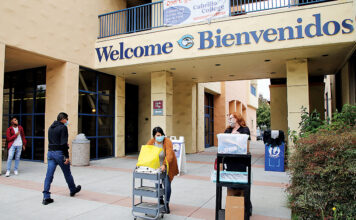The late 1960s and 1970s were a tumultuous time in America. The Vietnam War, serial killers, Civil Rights marches and the Black Power Movement were plastered across the nightly television news. Aptos was to get our own, very up-close-and-personal incident with the Black Power movement.
World War II attracted African Americans from the South to work in Bay Area shipyards. After the war those jobs mostly disappeared. Oakland had 121,000 Black Americans in 1966 when Huey Newton and Bobby Seale founded the militant Black Panther Party. The Panthers charged the police with brutality and disrespect for blacks, so they set up armed patrols. It was a much more aggressive form of protest than taking a knee at football games. In 1967, Huey Newton was convicted of killing a policeman who stopped his car. Huey appealed his conviction and was later acquitted.
In the spring of 1973, Huey Newton transferred as a student to the University of California, Santa Cruz, commuting from Oakland. The following year, Newton was charged with murdering a prostitute and also pistol-whipping his tailor. When he was released on bail, he skipped to Cuba, where he lived for three years before returning to face the charges.
Fast forward to Santa Cruz. While out on bail, Huey Newton continued his education at UCSC. On March 9, 1978, Huey’s bodyguard was arrested for threatening a cocktail waitress who refused to serve him a drink. The bodyguard, Robert Joe Heard, stood seven feet tall and weighed 300 pounds. He pleaded no contest.
And now for our Aptos story. Two months later, on the afternoon of May 11, 1978, Huey, his bodyguard and William Henry Moore, decided to wet-their-whistles at the Mediterranean bar in Seacliff. William Moore had been an instructor at Cabrillo College and later, was with the History of Consciousness program at UCSC. According to the newspaper, Kenny Hall of Aptos, said that he saw Newton and his bodyguard at the table of his best friend, Michael Johnson, a lineman with PG&E, and that he heard them say, “stand up if you want to do something about it.” Hall rushed toward them as his friend, Michael Johnson started to stand up and Newton punched Johnson in the face. At that point, Hall grabbed Newton by the neck and shoved him against the front window.
Hall said that Newton said something like, “Do it” and he saw that Heard, the bodyguard, was holding a gun. Heard said that he didn’t need a gun to whip Hall and Hall said, “Well, come on.” Heard handed the gun to Newton and then began fighting with Kenny Hall. A gunshot rang out and Newton was holding the gun straight up in the air. After the second shot, Kenny Hall went to the back room and closed the door against Newton. Today, there is still a bullet hole in the bar’s ceiling.
A different witness who saw Kenny Hall run behind the bar and into the liquor room said that it was Heard, the bodyguard, that pursued Hall with the gun (not Newton), and that he got his arm caught in the door as it was being closed and that he fired several shots into the liquor room before withdrawing. This witness said he was on the list of witnesses for the hearing but was not called. He also said that he received death threats not to testify.
Newton and the other two men left the bar and drove away just as Sheriff’s Deputy Randy Smiley arrived. He had to wait for the suspects to close their car door so that he could park. As Newton’s car left, the patrons ran out of the bar and told the Deputy to chase the suspects and warned him that they had a gun. The three were taken into custody shortly thereafter and a gun was found a block from where they were arrested.
The case went to a preliminary hearing with Judge William Kelsay presiding. Judge Kelsay had formerly been a prosecutor with the District Attorney’s office and had been a Judge for about a year. The hearing turned into what Judge Kelsay eventually described as “a can of worms,” with conflicting testimonies. At one point, Newton threatened that he would have to be bound and gagged unless he was granted a different attorney. Ultimately, the charges against Huey Newton were dropped and bodyguard Robert Heard was ordered to stand trial for being an ex-felon in possession of a firearm.
Huey Newton celebrated the victory but didn’t believe justice was served. He said, “By charging me unfairly, they have cost me bail premiums, attorney’s fees and time out of school. I’m out about $30,000. If you call that justice, we have a different standard.”
Heard failed to make his court appearance and disappeared. He was arrested over a year later in Georgia for theft, and was extradited. Heard ultimately pleaded guilty to the weapons charge.
In June 1980, Huey P. Newton received his Doctorate in the History of Consciousness from UCSC and the following year, coauthored a book on deceit and self-deception.
Have we got a show for you! Our next “Coffee, Tea and Mystery” presentation will be the real, firsthand account of what happened at the preliminary hearing and who-did-what-to-whom. Our presenter is Judge William Kelsay and it is guaranteed to be entertaining. Saturday, Jan. 27, 3-4:30 p.m. at the Rio Sands Hotel community room, 116 Aptos Beach Drive. $15 for Aptos History Museum members and $20 for non-members. Donation benefits the Museum. Reservations are required as this will sell out. 688-1467. If you like these stories, please consider becoming a member of the Museum.











